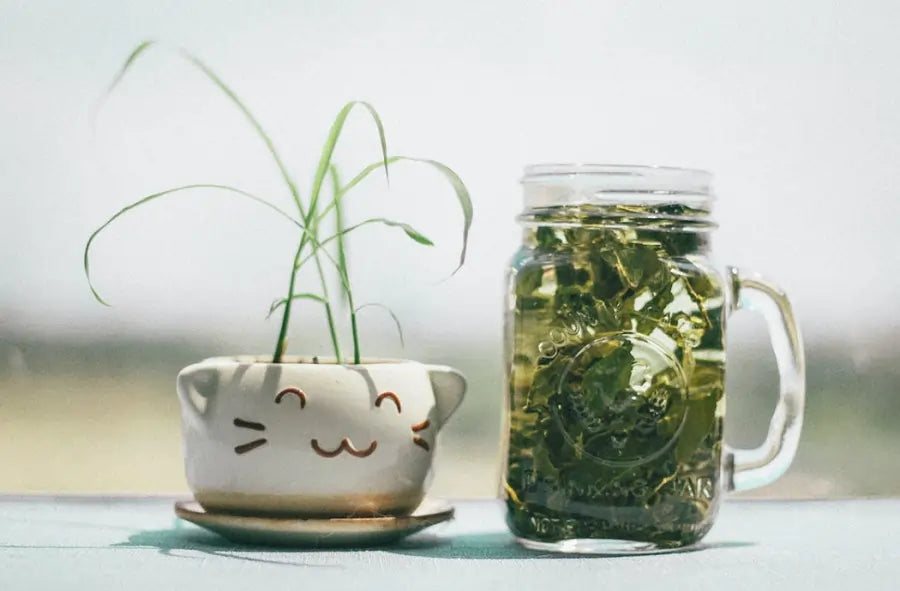
What are the Benefits of L-Theanine?
Share
When you think about it, tea isn’t just another drink that keeps us warm and toasty on a cold day. It’s had a massive influence on human history, and, in some ways, it may have actually helped to shape certain nations into the forms we recognize today.
It’s been referred to in famous books and poems, and it’s been depicted in great works of art going back hundreds of years. At times, it’s even formed the namesake of major historical events.
But why is this the case? What makes tea so special? Well, it’s not just the flavour. You see, most teas also contain an amino acid analogue called L-Theanine which can have some pretty interesting effects on the human body.
Interesting enough to start wars? Who's to say? But it definitely raises a few important questions, like - What is L-Theanine? What does it do? And are there any side effects?

|
L-Theanine has a wide variety of benefits which may explain part of mankind’s obsession with tea. These include things like -
That’s an impressive list all by itself. But strangely enough, when it’s combined with caffeine, L-Theanine actually provides additional benefits, such as -
|
Now, this all sounds pretty great, but without more information, we may be jumping the gun a bit. So, let’s take it slow and first figure out what we’re really talking about.
What is L-Theanine?
As noted, L-Theanine is an amino acid analogue commonly found in green and black teas. In recent years, it has also become prominent in pill or tablet form as people attempt to reap its beneficial upshots while avoiding some of the negative side effects that stem from drinking too much tea.
Are there any Side Effects to L-Theanine?
L-Theanine is known for its low toxicity and high tolerability in humans. As a result, L-Theanine tends to offer the aforementioned benefits with no notable drawbacks.
That said, is it generally advised that children and pregnant women avoid certain products like tea which contain L-Theanine, although this is normally because of the high levels of caffeine in these drinks, rather than the L-Theanine content.
Those with low blood pressure may also want to avoid L-Theanine as it may lower their blood pressure even further.
Does L-Theanine Block Anxiety and Stress?
Yes, it does. L-Theanine has been shown to have a calming effect on its users, which is probably why so many people around the world associate a warm cup of tea with the idea of rest and relaxation.
What’s more important though, is that L-Theanine tends to induce this sense of calm without causing drowsiness. This makes it the perfect supplement for individuals who need to destress without also losing their edge.

What are the Recommended Dosages for L-Theanine?
L-Theanine is usually taken in doses ranging from 200mg - 400mg, although it’s always wise to consult with a healthcare professional if you have any concerns about your specific condition.
Does L-Theanine Protect Brain Cells and Promote Cognitive Function?
Studies have shown that L-Theanine (especially when taken with caffeine), does seem to improve cognitive function and simple reaction times. This, combined with its stress-reductive properties, may work to reduce the harmful effects of anxiety on the human brain.
Does L-Theanine Reduce the Impact of Strokes?
A recent study has shown that L-Theanine can significantly reduce the increase in blood pressure usually associated with high-stress scenarios.
Because high blood pressure is considered a major risk factor when dealing with strokes, lowering and/or controlling it in high-stress situations can go a long way in reducing the overall likelihood of strokes while simultaneously mitigating some of the damage they do.
Does L-Theanine Play a Role in Ameliorating Schizophrenia?
L-Theanine has been shown to ameliorate positive, activation, and anxiety symptoms in schizophrenic patients and those suffering from schizoaffective disorders.
Additionally, the L-Theanine treatment was found to be ‘safe and well-tolerated’ by patients.
What is the Best Way to Take L-Theanine?
While most people get their L-Theanine from drinking tea, it is probably best to take it orally in pill or tablet form. This is due to the fact that certain negative side effects may occur in individuals who consume too much tea (although, once again, this is due to other ingredients found in the tea rather than because of the L-Theanine itself).
Does L-Theanine Promote Healthy Weight Loss?
It may. L-Theanine has been known to produce an umami flavour when consumed. This flavour may be responsible for reducing appetite, which could lead to healthy weight loss.
Does L-Theanine Improve Sleep Quality?
Some studies have reported an increase in sleep satisfaction in individuals who consume regular doses of L-Theanine.
It should be noted however, that the effects of caffeine may counteract these benefits if consumed too close to your bedtime.
Does L-Theanine have a Calming Effect?
Yes, it does. L-Theanine has been shown to lessen anxiety and bring on a feeling of relaxation. Importantantly, this feeling is achieved without simultaneously inducing sleep or drowsiness.
Does L-Theanine have Brain-boosting Effects?
Yes, it does. L-Theanine (especially when mixed with caffeine), has been shown to improve certain cognitive functioning such as simple reaction time and sentence verification accuracy.
Is L-Theanine Safe?
Given its low toxicity, L-Theanine is usually seen as a safe and effective dietary supplement. It has also been given a Generally Recognised as Safe (GRAS) rating by the US Food and Drug Administration (FDA).
As mentioned, healthcare professionals may caution against the use of L-Theanine in certain individuals such as with -
- Children
- Pregnant Women
- People with Low Blood Pressure

Is L-Theanine Addictive?
Studies show no evidence that L-Theanine produces an addictive behaviour effect within its users. While a dopamine release can occasionally result in addiction, the levels of dopamine produced by L-Theanine are too low to have such an effect.
In Conclusion - What is L-Theanine and How does it Work?
L-Theanine is an amino acid analogue usually found in green and black teas. In recent years, it has become known for its various health benefits and can be commonly taken in pill or tablet form as a dietary supplement.
Thanks to its low toxicity, L-Theanine has no confirmed negative side effects. Some side effects may occur if you consume too much tea, but these are due to other ingredients found in the tea rather than the L-Theanine.
L-Theanine’s main draw is the relaxing effect that it produces in sufficient quantities. This effect is known to lower anxiety and may alleviate certain schizoaffective conditions that are associated with higher levels of stress.
Importantly, this calming reaction is brought on without producing a feeling of fatigue or drowsiness, which makes it ideal for those who wish to mellow out whilst still remaining active and alert.
L-Theanine is also linked with an improvement in cognitive functioning, and can become even more effective when coupled with a dose of caffeine. Additionally, it is also able to lower blood pressure levels which can, in turn, lower the risk of strokes.
This apparent lack of side effects makes L-Theanine a healthy supplement for almost any adult, and should only be avoided in certain instances by children, pregnant women, and individuals with low blood pressure.
If you are unsure about how your system would react to L-Theanine, it is always wise to consult with a healthcare professional who can help you to determine if it is the right thing for you. That said, L-Theanine has been given the ‘Generally Recognised as Safe’ verification by the FDA, and is used safely by many people all around the world.
Some people may also find that L-Theanine produces an Umami flavour when consumed. This flavour has been known to lessen one’s appetite and may result in healthy weight loss over time.
There is currently no evidence to show that L-Theanine is addictive. It does produce a low level of dopamine upon intake, however this amount is not enough to create an addictive effect within individuals.
Found this article interesting? Take a look through some of our products regarding Caffeine & L-Theanine.

